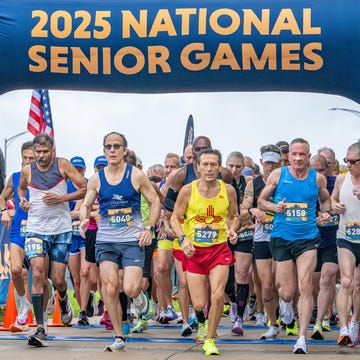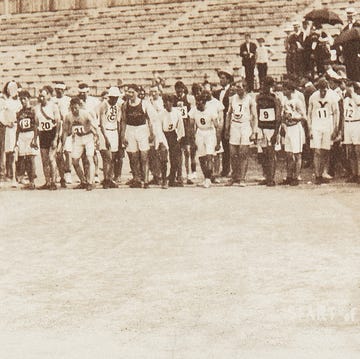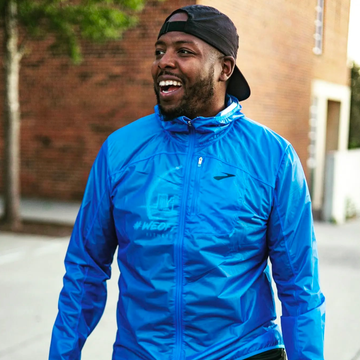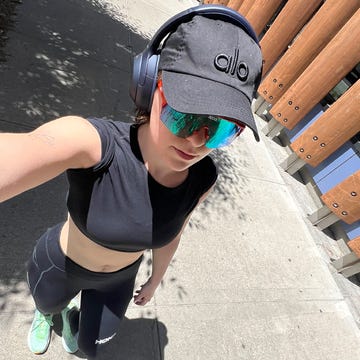Noah Droddy spent much of the first half of 2021 brooding.
He was still running; he wasn’t running. He was a professional athlete; he was an amateur.
Dropped by Saucony, his sponsor of four years, at the end of 2020, just after he had put up a 2:09:09 at The Marathon Project in Chandler, Arizona, Droddy, 31, was struggling to figure out his place in the running world.
Should he continue? If a shoe company didn’t want to support him, not after he moved to ninth all-time among U.S. marathoners (one second behind Meb Keflezighi), why was he doing this? Why all the 110-mile weeks over hilly roads around Boulder, Colorado? Why all the extra gym work?
“At some point you have to be realistic with yourself and wonder if the amount of time and energy you’re pouring into something is worth it anymore,” Droddy told Runner’s World. “I think it would be only normal for somebody in my situation to have those conversations.”
And, truth be told, he was hurt. Getting dropped by your sponsor? It doesn’t feel great.
His wife, Emma Kertesz, also a marathoner, watched and worried and talked through various scenarios with him. She tried to reassure him, yes, he was—is—a talented runner. He was worthy of support from a shoe company. But he had to train because he loved it.
That’s where Droddy finally landed. He needed to get back to running for the reason he started running in the first place: to see how good he is.
But first, in August, he did the one thing he needed to do most urgently: He got a job.
A regular paycheck
Droddy now works 35 hours per week in the warehouse for SOS Hydration. It comes with health insurance, something he hasn’t had since he was on his dad’s plan as a 23-year-old.
It can be physically demanding at times—he might be unloading pallets of product, putting it on shelves, carrying boxes around, packing orders.
“It’s nothing insane but definitely more physical work during the day than I was doing before,” Droddy said. “Which was zero.”
That physical activity can take a lot out of a runner. At first, Droddy, who had committed early in 2021 to run the New York City Marathon on Sunday, wasn’t sure he could keep his job and continue to train at a high level.
And then, slowly, he realized that both were possible. The company, Droddy says, has been really good to him. They’re flexible about his start time—around 9:30 or 10 a.m.—leaving him the mornings for the bulk of his training.
He leaves right at 5 and gets in a second run, either straight from the warehouse, or he drives home first, lets the dogs out, and runs from there.
Droddy says he’s proud of the buildup he’s had, and his workouts have been pretty close to what he’s done before other marathons.
“I’m in a good place here,” he said. “My training log is full of solid, consistent, marathon-pace stuff, which is essentially what I did before The Marathon Project. I think I can get to the line pretty confident I’m as good as I’ve ever been.”
He’s had to skip some of the extras—the trips to the gym, the soaks in the hot tub, the daily naps. He’s had to juggle workouts around on days he lacked energy. “I’m on my feet so much more,” he said. “I’m so much busier. It’s being a lot more flexible and gracious with myself in terms of getting the work in but also realizing it’s not the only thing I’m doing anymore.”
If all goes well on Sunday, he expects to be contending for top American honors and hopes to crack the top 10 overall. (Ben True, making his marathon debut, has also said he hopes to be top American.) Plus, Kertesz is running New York, too. It’s the first time they’ve been in the same marathon at the same time.
A new source of support
Over the past few months, Droddy has come to terms with the shifting landscape in running, where some of the best athletes don’t have formal support from shoe companies. Nell Rojas, for instance, who was the top American and sixth at the Boston Marathon, doesn’t have a shoe sponsor (not yet, anyway).
Chanelle Price, an 800-meter runner, recently retired after cobbling together a living for years based on the support of her team, Oregon Track Club Elite, and a sponsorship with a healthcare company in her hometown that she negotiated for herself.
“Running is a sport where there’s really not a middle class,” Droddy said. “You’re either a superstar commanding really good money, or you have the appearance of a sponsored athlete but you’re making $15 or $20,000 a year.”
Ironically, once Droddy realized he could make it all work with his job and his training, plus a newfound appreciation for running, that’s when a new sponsor came calling.
Droddy announced on November 4 that he’s now sponsored by Salomon, which is known for its trail shoes but is expanding more into road racing. He’ll wear a prototype of their carbon-fiber plated shoe on Sunday.
He’s thrilled to have the support of the company. “It’s the deal I’d been hoping for all along,” he said. “Just came 11 months later than I thought it would.”
But in case you’re wondering, don’t think he’s going to quit the warehouse job. It will be there for him on Monday, no matter what happens in New York.
“I’ve come to like working and like the structure of working,” Droddy said. “It takes the pressure off of my running. I plan on continuing both as I’ve been doing.
“If I can make it through a marathon training cycle,” he continued, “there’s no reason to change.”

Sarah Lorge Butler is a writer and editor living in Eugene, Oregon, and her stories about the sport, its trends, and fascinating individuals have appeared in Runner’s World since 2005. She is the author of two popular fitness books, Run Your Butt Off! and Walk Your Butt Off!













